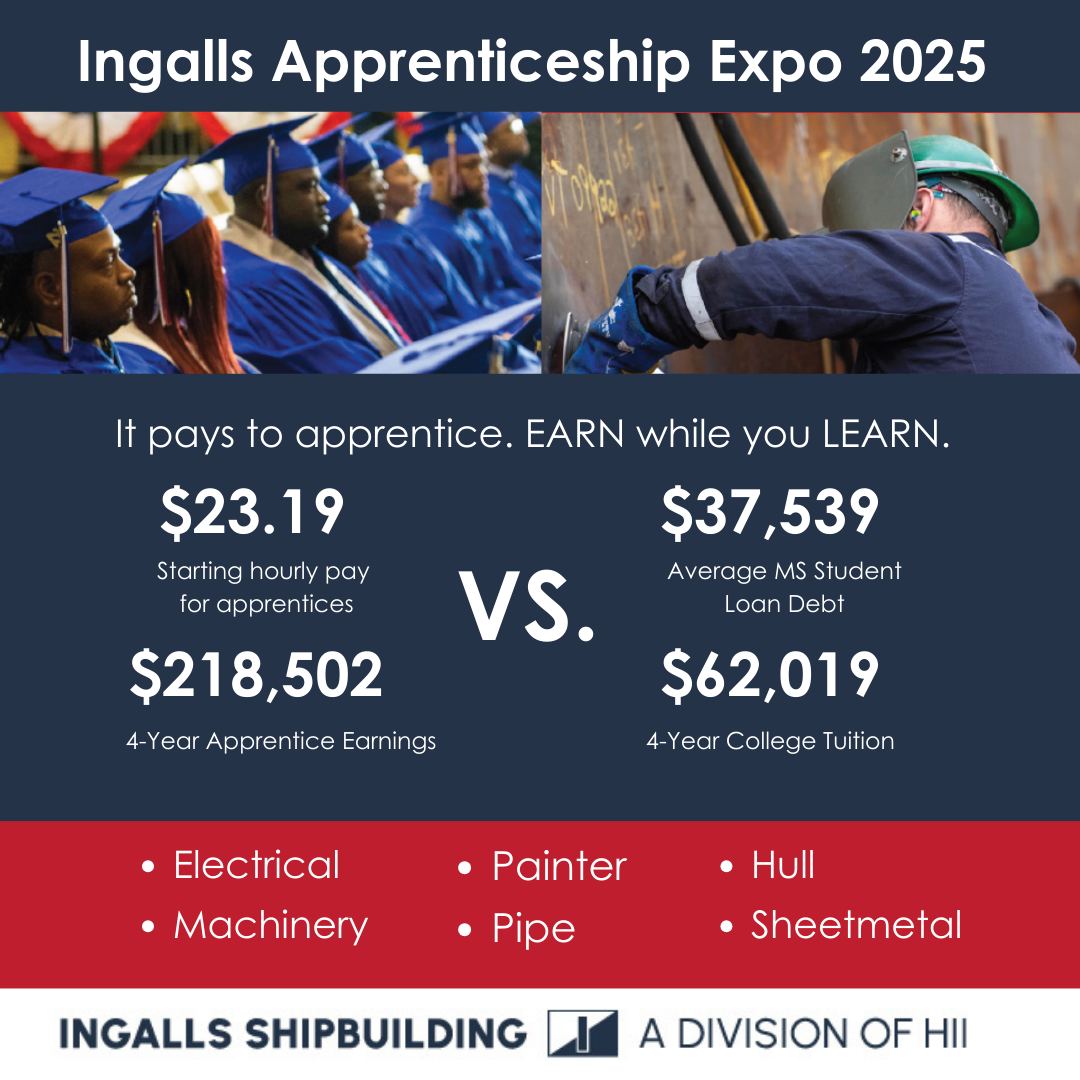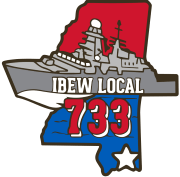IBEW Local 733 offers an Apprenticeship Program through the Joint Apprenticeship & Training Committee in conjunction with Ingalls Shipbuilding. Our JATC is designed to train workers for the marine electrical industry. The main focus of our JATC is to keep the shipbuilding industry ready with an adequate number of highly skilled journeyman level workers.
Advantages of Becoming a Union Electrician
One of the most significant benefits of being a union member is the competitive wage and benefits package that is among the best in the area. We understand the importance of health and well-being for our members and their families, which is why we negotiate benefits that provide peace of mind and security, both now and in the future.
In addition to earning while you learn, our on-the-job training programs provide practical experience and learning opportunities, ensuring you are equipped with the latest knowledge and skills to excel in your field. This training is a cornerstone of our commitment to professional development and continuous learning.

Being a union electrician also means having a voice in your future. Our members are not just employees; they are active participants in the union, with the right to speak on and vote on all issues that affect them. This democratic involvement is crucial in shaping the policies and decisions of the union.
Your rights to a safe job site and fair treatment are not just promises; they are guarantees backed by the strength of both our contract and our members. You will be part of a community that not only works together but looks out for one another. And you're not just earning a living; you're building a life grounded in skill, solidarity, and security.
If you are just starting out, apprenticeship is your fastest path to Journeyman status.
Frequently Asked Questions (FAQ)
An apprenticeship is a job in which the worker is paid to learn a set of skills through on-the-job training. An apprenticeship follows an earn while you learn model and leads to a nationally recognized credential that recipients can take anywhere in the country.
The U.S Department of Labor (DOL) has granted IBEW 733 and Ingalls Shipbuilding a registered apprenticeship program. Through this program, electrical apprentices learn on-the-job from experienced tradespeople as they make a livable wage and also receive mandatory classroom instruction as they work their way toward becoming a journeyman electrical worker.
The RA pay scale increases in March of every year, but the current RA pay scale is:
(Each Step represents passing grades + 500 hours)
| Step | Hourly Rate |
|---|---|
| Step 1a. | $22.59 per hour |
| Step 1b. | $23.03 per hour |
| Step 2a. | $23.48 per hour |
| Step 2b. | $23.92 per hour |
| Step 3a. | $24.37 per hour |
| Step 3b. | $24.82 per hour |
| Step 4a. | $25.27 per hour |
| Step 4b. | $25.71 per hour |
| Step 5a. | $26.16 per hour |
| Step 5b. | $26.60 per hour |
| Step 6a. | $27.04 per hour |
| Step 6b. | $27.49 per hour |
| Step 7a. | $27.93 per hour |
| Step 7b. | $28.39 per hour |
| Step 8a. | $28.83 per hour |
| Step 8b. | $29.28 per hour |
| 1st Class | $29.73 per hour |
Healthcare Premiums (with 90/10 coverage): Only $256/mo for individuals or $362/mo for families.
AD&D Life Insurance: $50,000 coverage
401K Company Match (between 4% and 8% Contributions): 50%
The IBEW 733 / Ingalls RA program is a thorough four-year learning experience, where you will rotate through all areas of the marine electrical trade – Layout, Installation, Hookup, and Testing
Generally, once or twice a year, Ingalls will open a requisition to apply for the Electrical RA program. It only stays open for a limited time, typically 2 to 3 weeks.
The apprenticeship schedule follows the agreed upon schedule with the company and in accordance with the current CBA. You will be required to attend class one day a week at times and days TBD. You will be paid 3 hours for every 4.5 hours of class time.
These eight classes run consecutively with each other throughout the apprenticeship, each class representing one whole step on the pay scale:
- DC Circuits
- AC Circuits
- Solid State: Devices and Circuits
- Electronic Communications
- Digital Electronics
- Solid State: Motor Control
- Programmable Logic Controllers
- Fiber Optics
No. Training and textbooks are both provided for free.
Minimum Qualifications:
- Must be at least 18 years of age.
- Must have a high school diploma or GED equivalent.
- Must pass a physical agility fitness test, with or without a reasonable accommodation, and without posing a direct threat to the health and safety of the individual or others.
- Must pass a hair follicle drug test.
- Must pass the ACT Work Keys test in Applied Math and Reading with a minimum score of 4 in each assessment.
Minimum Qualifications:
- Applicants must submit an online application, along with the following supporting documents:
- Driver's license, birth certificate, DD2-14 (military veterans), or other acceptable proof of age
- Copy of high school and/or college transcript(s), GED certificate, or other acceptable documentation of education
- Applicants meeting the minimum qualifications and submitting the required documents are notified where and when to appear for an interview (if applicable).
Selection Procedures:
- The sponsor may select apprentices from a pool of eligible applicants who meet the basic qualifications for the apprenticeship program. Applicants who meet the basic qualifications next must successfully complete the Work Keys Assessment. Applicants then may be considered for selection to the apprenticeship program based on interview (if applicable). The requirement of any qualification standard beyond minimum legal working age, education level, the Work Keys Assessment, the use of interviews, and the establishment of goals for the selection of minorities and women will be consistent with the requirements set forth in 29 CFR § 30.10(b).
Previous electrical experience, schooling, or training may help you qualify for the apprenticeship program. There are also Journeyman Candidate and JC-B classifications that accept a variety of training and experience without any classwork.
It isn’t necessary, but if you have previous Vo-Tech classes (esp. in electrical, electronics, robotics, etc.), it should help increase your scoring on the application.
The Journeyman Candidate classification requires a mixture of prior training and/or experience, while JC-Bs are essentially “Helpers” with zero experience. Both classifications have no classroom time but are required to certify in tack welding. The 5,000 hour JC-B program must be completed before entering the 7,000 hour JC program.
Yes, but you must either wait 30 days or pay on your own to have it done sooner. And more often than not, the requisition for the position will close if you do not pass the first time around.
These are a few sample questions.
Yes. See this PDF study guide.
Check here every week or two until a requisition opens. Alternatively, you could try starting out as a Journeyman Candidate or JC-B, depending on your past training and/or experience.
 IBEW
IBEW